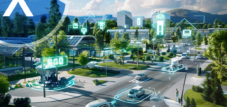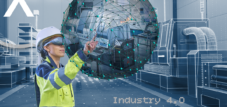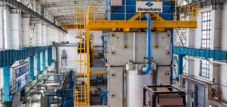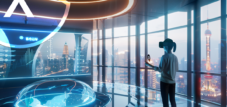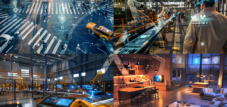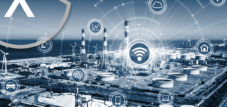Digitalization and its effects: A look at the key technologies of Industry 5.0 - The future in the metaverse?
Language selection 📢
Published on: July 19, 2024 / update from: July 19, 2024 - Author: Konrad Wolfenstein
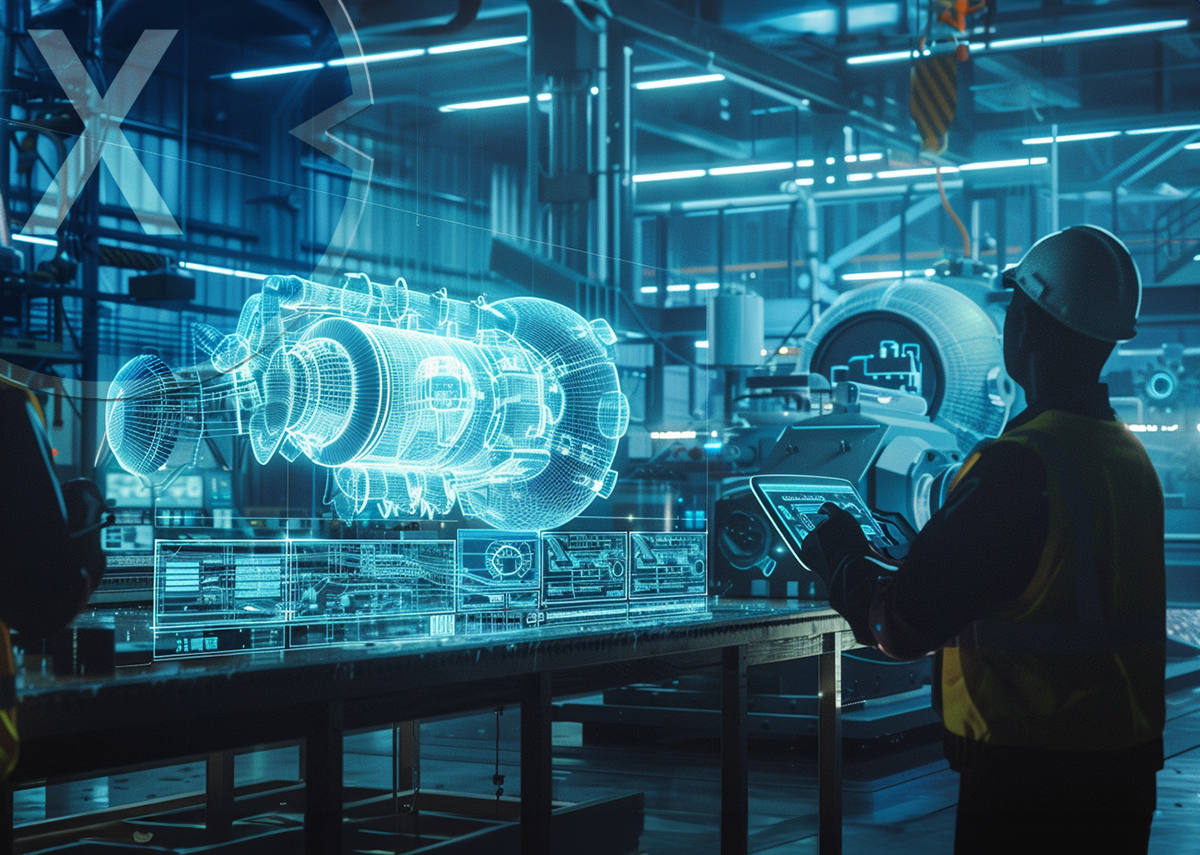
Digitalization and its effects: The future of the key technologies of Industry 5.0 in the Industry Metaverse? – Image: Xpert.Digitald
🌟🚀 The new era of digitalization: key technologies for a sustainable Industry 5.0
🌐📱 Digitalization and Industry 5.0 🌱🚀
Digitalization has profoundly changed numerous areas of our lives in the last few decades. With the transition to Industry 5.0, we are entering a new era characterized by even greater integration of technologies and intelligent systems. These new developments promise not only greater efficiency and productivity, but also a more sustainable and user-centered economy. In this context, it is important to understand the key technologies driving this change. This text is based on the PDF document provided and supplements it with important and interesting content to paint a comprehensive picture of the current digital revolution.
🤖 Key technologies of Industry 5.0
Industry 5.0 is based on a number of key technologies that work together to create a smarter and more efficient production environment. These technologies include blockchain, the Internet of Every Things (IoET), big data analytics, edge computing, artificial intelligence (AI), cobots, 6G and beyond, and digital twins. Each of these technologies contributes to industry transformation in specific ways.
Blockchain
Blockchain technology provides decentralized management and operational transparency, particularly useful for creating digital identities and a compartmentalized approach. This leads to improved safety and traceability in industrial processes.
Internet of Every Things (IoET)
IoT expands the concept of the Internet of Things (IoT) and integrates smart devices into every aspect of our lives and work. This enables greater connectivity and interoperability, which in turn leads to more efficient use of resources and better real-time decision making.
Big Data Analytics
Big data analytics plays a central role in analyzing and processing large amounts of data to gain valuable insights. This technology enables faster and better decisions, promotes competitive pricing and provides real-time forecasts that are crucial for optimizing business processes.
Edge computing
Edge computing reduces latency and lowers storage costs by processing data closer to the source. This increases asset productivity, reduces costs and improves the efficiency of supply chains and logistics systems.
Artificial Intelligence (AI)
AI drives intelligent automation, resulting in greater efficiency and quality assurance. AI systems can quickly make decisions and optimize processes, resulting in greater productivity and consistency.
Cobots
Collaborative robots or cobots work directly with human workers, increasing productivity and efficiency. They are robust and offer improved dexterity, resulting in more consistent and accurate results.
6G and beyond
The next generation of wireless communications technology, 6G, promises ultra-low latency, high reliability and even greater bandwidth. These improvements will provide the foundation for ultra-reliable networks and enable a variety of new applications, including advanced industrial applications and autonomous systems【5:0†d2.pdf】.
Digital twins
Digital twins are virtual models of physical objects or systems that reflect their properties and behavior in real time. They enable cost-effective failure prediction, design customization and predictive maintenance, resulting in significant cost savings and improved operational efficiency【5:0†d2.pdf】.
🌍 Additional content and its meaning
To deepen the understanding of these technologies and their impact, it is important to highlight some complementary aspects:
Sustainability and energy efficiency
Digitalization and the introduction of Industry 5.0 technologies contribute significantly to sustainability and energy efficiency. By optimizing processes and using resources intelligently, companies can reduce their ecological footprint and operate more sustainably.
Privacy and security
With increasing networking and digitalization, the importance of data protection and security also increases. Technologies such as blockchain and edge computing offer innovative approaches to ensuring the security of data and networks while increasing transparency and traceability.
Human-machine collaboration
The integration of cobots and AI into the work environment is changing the way people interact with machines. This collaboration makes it possible to combine human skills with machine precision, resulting in more efficient and safer work processes.
Economic impact
Digitalization and the introduction of Industry 5.0 technologies have profound economic impacts. They not only promote the productivity and competitiveness of companies, but also create new business opportunities and jobs in various sectors.
Future prospects
The further development and integration of these technologies will continue to play a central role in the future. Companies that embrace these trends early on and invest in corresponding innovations will remain competitive in the long term and benefit from the advantages of digital transformation.
🚀 Key technologies of Industry 5.0
Digitalization and the introduction of key technologies of Industry 5.0 mark a decisive step towards a smarter and more efficient future. By combining technologies such as blockchain, IoT, big data analytics, edge computing, AI, cobots, 6G and digital twins, companies can optimize their processes, reduce costs and improve the quality of their products and services. At the same time, new opportunities are opening up for sustainable business and improved human-machine collaboration. Given these developments, it is crucial for companies and decision-makers to continually stay informed about technological advances and adapt their strategies accordingly in order to meet the challenges and opportunities of the digital future.
📣 Similar topics
- 🌍 The digital transformation: On the way to Industry 5.0
- 🤖 Cutting-edge technologies for Industry 5.0: Efficiency through intelligent systems
- ♻️ Ecologically sustainable: The role of Industry 5.0 in environmental protection
- 🔐 Secure and connected: data protection in Industry 5.0
- 🤖 Man and Machine: Collaborative Robots in Modern Industry
- 📈 Economic opportunities through Industry 5.0: Recognizing new business models
- 🚀 Visions of the future: developments and trends in Industry 5.0
- 🛠️ Increased efficiency through Industry 5.0 technologies
- 📊 Big Data and Industry 5.0: Data-driven decisions
- 🌐 Connected worlds: From IoET to 6G in Industry 5.0
#️⃣ Hashtags: #Industry5.0 #Digitalization #Sustainability #Data Protection #HumanMachineCollaboration
Our recommendation: 🌍 Limitless reach 🔗 Networked 🌐 Multilingual 💪 Strong sales: 💡 Authentic with strategy 🚀 Innovation meets 🧠 Intuition
At a time when a company's digital presence determines its success, the challenge is how to make this presence authentic, individual and far-reaching. Xpert.Digital offers an innovative solution that positions itself as an intersection between an industry hub, a blog and a brand ambassador. It combines the advantages of communication and sales channels in a single platform and enables publication in 18 different languages. The cooperation with partner portals and the possibility of publishing articles on Google News and a press distribution list with around 8,000 journalists and readers maximize the reach and visibility of the content. This represents an essential factor in external sales & marketing (SMarketing).
More about it here:
💡🔧 The future of the key technologies of Industry 5.0 in the industry metaverse
🌟 When we think of the industrial revolution, we have experienced several significant upheavals that have led to a drastic change in production and working methods. From the mechanization through water and steam power in the first industrial revolution to digitization and networking in the fourth, technological advances have steadily developed. However, today's discussion is increasingly about the term “Industry 5.0” in combination with the emerging concept of the industrial meta verses. These two developments could mark the next major transformation in the industrial landscape and bring about profound changes in the way we work, produce and interact.
🤖📈 Industry 5.0 – People-centered innovation and sustainability
Industry 5.0 builds on the achievements of Industry 4.0, which uses robots, artificial intelligence (AI), the Internet of Things (IoT) and big data to create smart factories. But in contrast to its predecessor, Industry 5.0 places a greater focus on collaboration between humans and machines. The goal is to combine humans' unique creativity and analytical thinking with the precise and powerful capabilities of robots. This cooperation leads to a more harmonious and efficient production process while promoting a more sustainable and humane working environment.
A core aspect of Industry 5.0 is increasing human creativity and innovation through intelligent technologies. Collaborative robots, also known as cobots, are a crucial element here. They are designed to work alongside people and support them with complex tasks without increasing the risk of accidents. Using cobots allows human workers to focus on the creative and strategic aspects of their work, while routine and repeatable tasks are taken over by machines.
🌐🔍 The Industry Metaverse – The Virtual Expansion of the Industry
The concept of the metaverse, known from the entertainment and gaming industries, is increasingly being transferred to the industrial world. The industrial metaverse promises to use this virtual reality to optimize industrial processes, make training more realistic and promote exchange and collaboration. In this virtual space, factories and production lines can be simulated and monitored in real time, making it possible to identify and fix problems early, test prototypes and develop new products before committing physical resources to them.
Augmented reality (AR) and virtual reality (VR) allow employees to experience technical instructions and training content as if they were there, improving efficiency and understanding. These technologies also enable seamless collaboration between globally distributed teams by providing virtual meetings and workspaces that almost eliminate the need for physical presence.
🤝🌌 Synergy of Industry 5.0 and the Industry Metaverse
Combining the principles of Industry 5.0 with the possibilities of the industrial metaverse could lead to an even broader revolution. The human-centered philosophy and emphasis on sustainability and collaboration in Industry 5.0 can reach a new dimension in the industry metaverse. For example, an engineer in a virtual factory could interact directly with cobots and other intelligent systems to optimize production processes or design new concepts.
The personalized and immersive nature of the Metaverse further supports tailored workforce training and development. Employees can train in virtual environments that are exact replicas of their actual work environments, resulting in greater transfer of learning. Additionally, digital twins – virtual replicas of physical objects and processes – enable precise, real-time monitoring and analysis. This leads to better prediction of production problems and optimized maintenance of machines, minimizing downtime and maximizing productivity.
♻️⚙️ Sustainability and efficiency in the foreground
In a world increasingly characterized by environmental problems and resource scarcity, sustainability and efficiency are moving to the forefront of industrial efforts. Industry 5.0 and the industrial metaverse offer considerable potential here. By simulating and optimizing production processes, resource consumption and waste can be significantly reduced. Intelligent systems could automatically adjust energy consumption and optimize resource flows in real time, not only reducing costs but also reducing environmental impact.
In addition, the concept of the circular economy, which is part of the sustainable Industry 5.0 philosophy, enables seamless integration into the industrial metaverse. Materials and products are designed so that they can be recycled and reused after their service life. Using virtual models, companies can fully think through and design the recyclability and ecological impact of their products as early as the planning phase.
🔒🛡️ The challenge of cyber security
With increasing digitalization and networking, the development of Industry 5.0 and the industrial metaverse also brings with it challenges in the area of cyber security. The massive networking of machines, systems and people requires advanced security measures to protect sensitive data and operational processes from cyber attacks. AI-supported security solutions that can detect and ward off threats in real time are playing an increasingly important role.
🚀🌟 The revolution of the industrial future
The integration of Industry 5.0 and the industrial metaverse represents a significant evolution in the industrial revolution. This new era will be characterized by close collaboration between humans and machines, supported by advanced virtual reality. It promises more effective and sustainable production, improved workforce training and development, and optimized processes perfected through ongoing monitoring and analysis.
Industry 5.0 and the industrial metaverse will not only increase efficiency and productivity in industry, but also create a new dynamic and inclusive work landscape. The future of these technologies is promising and has the potential to fundamentally change the way we work and produce industrially. However, the path forward is accompanied by the need to address security and data protection concerns and ensure responsible and sustainable use of these technologies. This is the only way to exploit the full potential of Industry 5.0 and the industrial metaverse to create a better and sustainable world.
📣 Similar topics
- 🤖 People and machines united: The synergy of Industry 5.0 and the industrial metaverse
- 🌐 Virtual worlds: The industrial metaverse as the future of industrial production
- 🔧 Collaborative robots and cobots: Revolutionary helpers in Industry 5.0
- 🌱 Sustainability redefined: Efficient production in the industrial metaverse
- 🔍 Digital twins and their role in modern production
- 📡 5G, 6G and the next generation of industrial networking
- 🔒 Cyber security challenges in the world of Industry 5.0
- 🚀 Transforming Industry: How the Metaverse is Changing Manufacturing
- 🌍 Global collaboration in virtual space: New opportunities for companies
- ⚙️ The role of big data and blockchain in Industry 5.0
#️⃣ Hashtags: #Industry5.0 #IndustryMetaverse #Sustainability #Collaboration #CyberSecurity
🗒️ Xpert.Digital: A pioneer in the field of extended and augmented reality
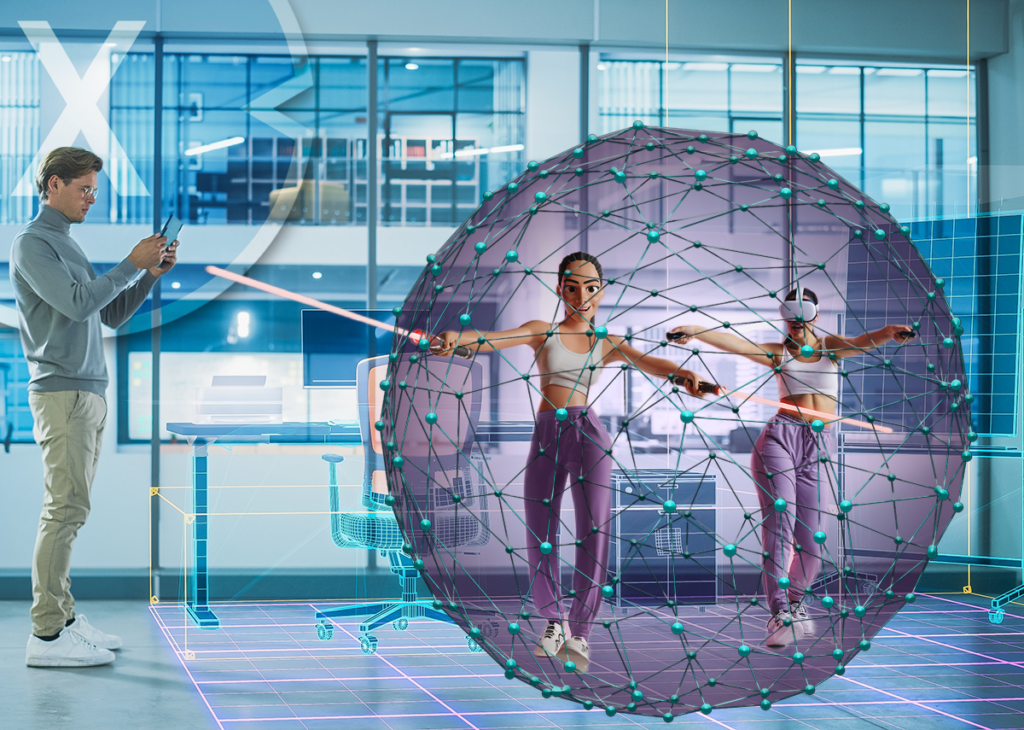
Find the right Metaverse agency and planning office such as a consulting firm - Image: Xpert.Digital
🗒️ Find the right Metaverse agency and planning office such as a consulting firm - search and search for top ten tips for consulting & planning
In the age of digitalization, where technologies such as Extended Reality (XR) and the Metaverse are constantly becoming more relevant, Xpert.Digital positions itself as an opinion leader and pioneer. With over 1,500 specialist articles, Xpert.Digital has established itself as a central point of contact for the industry.
🌌 Extended Reality (XR): The best of both worlds
Extended Reality is a collective term that includes virtual reality (VR), mixed reality (MR) and augmented reality (AR). Xpert.Digital is committed to creating immersive XR experiences that are both informative and entertaining.
- Interactive Experiences: XR allows users to immerse themselves in virtual worlds and interact with their surroundings in ways previously unimaginable.
- Education and Training: XR can be used for educational purposes to convey complex topics and concepts in an understandable and tangible way.
- Entertainment: Whether games, films or art – XR opens new horizons in digital entertainment.
🔮 Augmented Reality (AR): See the world through digital eyes
Augmented Reality, a particular focus of Xpert.Digital, makes it possible to integrate digital information or graphics into the real world. The possibilities are nearly unlimited.
- Marketing and Advertising: AR can be used to create interactive advertising campaigns that engage customers in a whole new way.
- Everyday help: From navigation apps that project the route directly onto the street to furniture apps that show what a new sofa would look like in the living room - AR makes it possible.
🌐 The Metaverse: The Next Big Thing
The Metaverse is a virtual world where people can interact through avatars and create shared experiences. Xpert.Digital recognizes the enormous potential of the Metaverse and is working to translate this potential into usable products and services.
- Social Interaction: The Metaverse offers the opportunity to connect with people from all over the world and share common experiences.
- Economy and trade: Virtual goods and services can be traded in the metaverse, which opens up completely new business models and sources of income.
- Creative Freedom: From building your own worlds to designing custom avatars, the Metaverse is a place of endless creative possibilities.
🚀 Xpert.Digital at the forefront of innovation
Xpert.Digital shows how a company can be at the forefront of the technological revolution. With their focus on XR, AR and the Metaverse, they are well positioned to shape and define the future of digital interaction.
More about it here:
⚙️✨ The future of the key technologies of Industry 5.0 in the industrial metaverse
💡🔧 Industry 5.0 is on the horizon and promises to usher in the next industrial revolution. While Industry 4.0 was characterized by the integration of cyber-physical systems and the Internet of Things (IoT), Industry 5.0 goes one step further. The focus here is on collaboration between humans and machines and the creation of an intelligent and connected environment. The industrial metaverse plays a central role here - a digital space that seamlessly connects physical and virtual worlds. In this context, some key technologies become particularly important: blockchain, Internet of Every Things (IoET), big data analytics, edge computing, cobots/robotics, 5G/6G and beyond, as well as digital twins. Let's take a closer look at these technologies and how they could shape the future.
🌐 Blockchain
Blockchain technology has already proven to be revolutionary in many areas. It will play an even more crucial role in Industry 5.0. The decentralization and security that blockchain offers can make supply chains more transparent and efficient. Smart contracts – self-executing contracts with the terms of the agreement written directly into the code – enable automation and reduction of transaction costs. This is particularly important in a highly connected industrial metaverse, where data continuously moves between different actors and trust plays a central role.
🔗 Internet of Every Things (IoET)
While the Internet of Things (IoT) connects devices together, the concept of the Internet of Every Things (IoET) goes even further. It not only connects devices, but also people, processes, data and things. This extensive networking creates a hyper-connected environment in which data can be exchanged and analyzed in real time. Products and production systems can control themselves autonomously, which significantly increases the efficiency and flexibility of production. The IoET thus forms a central building block for the industrial metaverse and enables previously unimagined interactivity and integration.
📊 Big Data Analytics
Digitalization leads to an exponential increase in data. Big data analytics helps analyze these huge amounts of data and gain valuable insights. In Industry 5.0, big data analytics enables accurate maintenance predictions and predictive analytics, reducing downtime and increasing productivity. By analyzing production data, weak points can be identified and optimized. In addition, customer needs can be better predicted and production processes can be flexibly adjusted. This leads to individualized mass production in which even small batch sizes can be manufactured economically.
💻 Edge computing
Another key technology for Industry 5.0 is edge computing. Unlike traditional cloud computing models, data is not processed centrally, but rather decentrally in close proximity to the data sources. This significantly reduces latency and enables real-time decisions. In an industrial metaverse in which data streams from a multitude of networked devices come together, this immediate data processing is essential. Edge computing ensures that production processes can be controlled faster and more efficiently. In addition, the bandwidth load is reduced, which is particularly advantageous in conjunction with 5G and 6G networks.
🤖 Cobots/Robotics
Collaborative robots, also known as cobots, are redefining the use of robots in industry. Instead of replacing humans, cobots work alongside human workers, assisting them with monotonous or dangerous tasks. This collaboration creates hybrid manufacturing environments in which the strengths of both parties are optimally utilized. In the context of Industry 5.0 and the industrial metaverse, cobots help to make production processes more flexible and safer. They are easy to program, making it easier for even smaller companies to get started with automation.
📡 5G, 6G and beyond
Fast and reliable communication is the backbone of Industry 5.0. The expansion of 5G networks has already begun and offers enormous potential for the industry, particularly through high data transfer rates and low latency. With 6G, even faster networks are on the horizon in the future, which will enable almost instantaneous communication. This is particularly important for applications in the industrial metaverse that rely on real-time data. Reliable networking ensures that all devices and systems can communicate smoothly with each other, paving the way for new business models and increased efficiency.
🔍 Digital Twins/Industrial Metaverse
One of the most promising technologies in Industry 5.0 is the digital twin. This is a virtual image of a physical object that can map its entire life cycle. Digital twins make it possible to test and optimize complex systems in a simulation environment before implementing changes in the real world. This significantly reduces development times and costs. In the industrial metaverse, digital twins not only interact with each other, but also with real machines and systems. This bidirectional communication ensures that adjustments and improvements can be implemented in real time. The industrial metaverse thus offers a dynamic and flexible production environment aimed at continuous improvement and innovation.
🌐 The synergy of technologies in the industrial metaverse
The true value of these key technologies lies in their integration and synergy within the industry metaverse. Imagine the following scenarios:
A manufacturer uses IoET to network all machines and products. Thanks to big data analytics, all collected data is evaluated in real time, and every transaction and data transfer is processed securely using blockchain. Cobots support human workers, and edge computing ensures that all critical data is processed immediately on site. Thanks to fast communication through 5G or 6G, every decision and adjustment is implemented without delay. Finally, digital twins are used to simulate and optimize production processes before they take place in reality.
These technologies working together create a production environment that is not only efficient and flexible, but also intelligent and adaptive. Companies can react more quickly to market changes, produce customized products in large quantities and at the same time keep costs down.
🚀 The challenges and opportunities of Industry 5.0
Despite all the advantages, there are also challenges that must be overcome. These include, for example, data protection and data security. In a completely networked environment, the volume of data is immense and its security is essential. Blockchain technology can help here, but continued progress in cybersecurity will be required.
Another challenge is the qualification of the workforce. The integration of cobots and the increasing use of AI require new skills and knowledge. Companies must invest in the training and development of their employees to fully exploit the potential of the technology.
On the other hand, there are enormous opportunities: companies can use new technologies to increase their competitiveness, develop innovative business models and open up new markets. The increased efficiency and flexibility in production makes it possible to fulfill customer requests faster and more precisely.
🔮 Industry 5.0 and the industrial metaverse
The future of Industry 5.0 is closely linked to the concept of the industrial metaverse and the key technologies integrated into it. Blockchain, IoT, big data analytics, edge computing, cobots, 5G/6G and digital twins work hand in hand to usher in a new era of industrial production. Companies that successfully implement and use these technologies will be able to comprehensively revolutionize their production processes and assert themselves in a globalized market. Despite some hurdles and challenges, the opportunities and possibilities that this technological development brings with it predominate. Industry 5.0 and the industrial metaverse are poised to fundamentally change the way we produce and do business.
📣 Similar topics
- 🛠 The key technologies of Industry 5.0: An overview
- 🌍 Blockchain and its role in the industry metaverse
- 🤝 IoET: The future of connected production
- 📈 Big Data Analytics: The fuel of Industry 5.0
- ⚡ Edge Computing: Fast decisions in real time
- 🤖 Cobots: humanity's new helpers in production
- 📶 5G, 6G and beyond: The communications infrastructure of the future
- 📽 Digital twins: From virtual model to reality
- 🔧 The synergy of technologies in the industrial metaverse
- 🔐 Challenges and opportunities in a connected world
#️⃣ Hashtags: #Industrie5.0 #IndustrieMetaversum #Blockchain #Cobots #DigitalTwins
We are there for you - advice - planning - implementation - project management
☑️ SME support in strategy, consulting, planning and implementation
☑️ Creation or realignment of the digital strategy and digitalization
☑️ Expansion and optimization of international sales processes
☑️ Global & Digital B2B trading platforms
☑️ Pioneer Business Development
I would be happy to serve as your personal advisor.
You can contact me by filling out the contact form below or simply call me on +49 89 89 674 804 (Munich) .
I'm looking forward to our joint project.
Xpert.Digital - Konrad Wolfenstein
Xpert.Digital is a hub for industry with a focus on digitalization, mechanical engineering, logistics/intralogistics and photovoltaics.
With our 360° business development solution, we support well-known companies from new business to after sales.
Market intelligence, smarketing, marketing automation, content development, PR, mail campaigns, personalized social media and lead nurturing are part of our digital tools.
You can find out more at: www.xpert.digital - www.xpert.solar - www.xpert.plus








